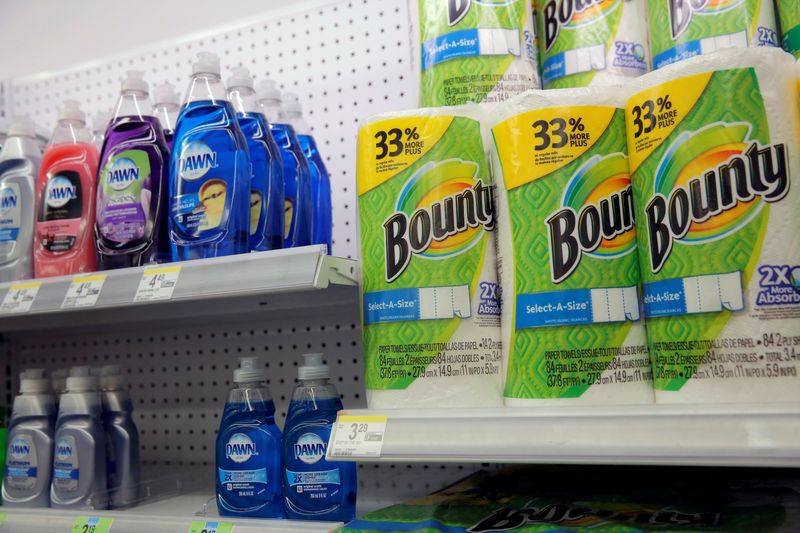By Richa Naidu and Hilary Russ
CHICAGO/NEW YORK (Reuters) - Germ-conscious in the pandemic era but still craving a donut and coffee? Procter & Gamble, which has already teamed up with Dunkin' Brands to promote the use of its cleaning products in restaurants, is looking for more partners -- and it's hoping for a payoff in the grocery store aisle.
Procter & Gamble (N:PG) is chasing deals with fast-food, hospitality, transportation and healthcare companies to stick P&G branding for products like Dawn dish soap and Spic and Span counter scrubs prominently on walls and windows to help lure back customers who began to shy away from places like restaurants and hotels in March as fears of the coronavirus took hold, the company told Reuters.
P&G in July struck agreements with several existing restaurant partners - including Dunkin' Brands' (O:DNKN) donut shops and Denny's (O:DENN) coffee shops - to tout their use of Dawn and Spic and Span counter scrubs.
It's a "halo effect," Paul Edmondson, the head of P&G Professional North America, said of the promotion's marketing advantage. "It's the same consumer that's shopping in stores that's eating out at one of the restaurants."
P&G, one of the top advertising spenders in the United States, is racing against Clorox (N:CLX) and Lysol maker Reckitt Benckiser (L:RB) to plug home cleaning brands at restaurants and other businesses.
"The reason why P&G wants to do this is because...it can produce free publicity," said Kimberly Whitler, an associate professor of business at University of Virginia Darden (NYSE:DRI) School of Business and a former P&G marketing executive. "It's a new outlet where consumers are not necessarily thinking about P&G products, and suddenly they're seeing them there."
Promoting household products such as Spic and Span, Dawn and Microban 24 sanitizer at major restaurant chains can serve as a cheap form of marketing for P&G, said Lisa Kane, group director for strategy at branding firm Siegel+Gale.
"It gives them more control, and they can choose who they partner with and allow this co-branding with," Kane said. P&G's clients may tout their locations as deep-cleaned and disinfected frequently, although the promotion doesn't require an inspection or any independent verification by P&G that the locations are actually clean.
Disinfectants kill whatever is on a surface, but not long term - these businesses would have to spray things down over and over again if people are constantly sitting on chairs or using bathrooms, regulatory consultant Kevin Kutcel said. "Legally, 'deep-cleaning' doesn't mean anything," he added.
In May, Reckitt Benckiser signed a deal with Hilton Hotels (N:HLT), which put up signs and labels in hotel lobbies saying its bed sheets and common spaces are cleaned using Lysol or Dettol products. Rival Clorox Co (N:CLX) recently began working in some cities with ride-sharing company Uber (NYSE:UBER) (RIC), whose users now get a notification with each booking confirmation that their driver has Clorox wipes available - with the Clorox logo prominently displayed.
"We believe that advertising is our way to play offense, gain market share and benefit disproportionately for years to come," Clorox's chief executive, Benno Dorer, told Reuters in an interview. "We can grow market share when others do the opposite."
Clorox, which plans to spend an amount representing about 11% of sales on advertising during this fiscal full year, said it is in talks with "a lot more companies" for corporate deals, but declined to name any in the works.
"There's enough research suggesting that during a recession, market share gains are much stickier and have a much more profound long-term effect," Dorer said.
P&G says marketing its products is not the main goal of its deals, and it is not forcing any restaurants to use stickers that specifically cite P&G brands.
To lure customers who may be nervous about dining out, some restaurant chains have begun putting signs in visible locations stating that they are participating in safety "seal of approval" programs run by the National Restaurant Association and other groups.
Nearly all advertisers have confronted a chaotic marketing landscape on TV and social media this year, reworking ads to be sensitive to national reckonings over the health crisis as well as racism.

P&G has spent more than $65 million to advertise Mr. Clean on TV so far this year, and more than $36 million on commercials for its home cleaner Microban, according to data from TV ad tracking firm iSpot.